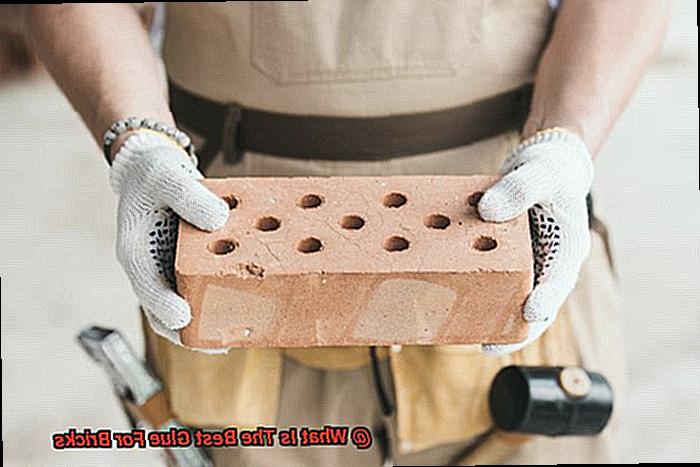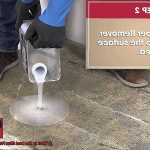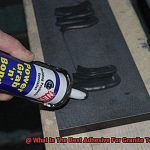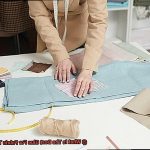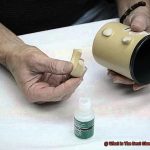Picture this: you’re in the midst of a challenging DIY project involving bricks. Maybe you’re creating a picturesque brick pathway, repairing a crumbling wall, or constructing an envy-inducing outdoor grill. Whatever the case may be, finding the right adhesive is key to achieving sturdy and long-lasting results. But with an overwhelming assortment of options out there, it’s tough to determine which glue will truly conquer those stubborn bricks.
Fear not. In this all-encompassing guide, we’ll take you on a journey through the advantages and disadvantages of different types of adhesives. Armed with this knowledge, you’ll be able to make an informed decision based on your unique needs. We’ll explore popular choices like mortar, construction adhesive, and even specialized brick adhesives. So buckle up and get ready to discover the ultimate glue for bricks that will take your next project to new heights.
But before we dive into the nitty-gritty details of specific adhesives, let’s consider what makes a particular glue perfect for bonding bricks. You see, the ideal adhesive needs to possess exceptional bonding strength capable of withstanding both vertical and lateral forces. It must also stand strong against environmental conditions like moisture and extreme temperatures while remaining flexible enough to accommodate natural brick movement. And let’s not forget about ease of application and compatibility with different types of bricks – these are crucial qualities that ensure a successful bonding experience.
Now that we’ve laid down the groundwork, it’s time to embark on our exploration of different adhesive options commonly used in brick projects. Get ready for some serious adhesive-induced excitement.
What is Mortar and What Makes it the Best Glue for Bricks?
Contents
- 1 What is Mortar and What Makes it the Best Glue for Bricks?
- 2 Advantages of Using Mortar as a Glue for Bricks
- 3 Construction Adhesives: A Suitable Alternative to Mortar
- 4 Benefits of Using Construction Adhesives for Bonding Bricks
- 5 Other Types of Adhesives Used for Bonding Bricks
- 6 Epoxy-Based Adhesives: Ideal for Industrial Applications
- 7 Polyurethane Adhesives: Flexible and Impact-Resistant
- 8 Choosing the Right Glue Based on Brick Type
- 9 Conclusion
When it comes to building structures with bricks, finding the right adhesive is crucial. The adhesive needs to be strong, durable, and capable of withstanding various environmental factors. Among the different options available, mortar stands out as the best glue for bricks. In this article, we will explore the purpose of mortar and what makes it superior to other gluing methods.
The Power of Mortar:
Mortar is a mixture of cement, sand, water, and additives that forms a solid bond between bricks. Its primary function is to provide structural integrity and durability to the masonry work. By acting as a bonding agent, mortar ensures that the load is evenly distributed across the entire structure, making it strong and stable.
The Magic Behind Mortar:
What sets mortar apart from other adhesives is its ability to harden over time. As cement undergoes hydration, a chemical reaction occurs, resulting in a solid matrix within the mortar. This gradual hardening process gives mortar its adhesive properties and strength. It transforms from a wet mixture into a solid substance that securely holds the bricks together.
Flexibility is Key:
Unlike other adhesives, mortar offers flexibility. This elasticity allows it to accommodate slight movements or shifts in the structure without cracking or breaking. Whether it’s seismic activity or temperature variations causing expansion and contraction, mortar can withstand these stresses without compromising the integrity of the brickwork.
Customizable Composition:
Mortar can be tailored to suit different applications and desired properties. The type of cement used, such as Portland cement or lime-based cement, determines the strength and characteristics of the mortar. The ratio of cement to sand also plays a significant role in determining adhesive strength and workability. By adjusting these components, builders can create mortars that meet specific project requirements.
Enhanced Properties:
Various additives can be incorporated into mortar to enhance specific properties. Plasticizers or superplasticizers improve workability and flowability, making it easier to apply between bricks. Retarders or accelerators control the setting time of the mortar, allowing for adjustments during construction. Additionally, suitable aggregates and additives can reduce the permeability of the mortar, providing good water resistance. This added protection ensures that the brickwork remains intact even in areas prone to moisture.
Fire Resistance:
Mortar also offers a level of fire resistance to masonry structures. The evaporation of water within the mortar creates a layer of steam when exposed to high temperatures, acting as a barrier against heat transfer. This property helps protect the bricks and maintain their structural integrity during a fire.
Advantages of Using Mortar as a Glue for Bricks
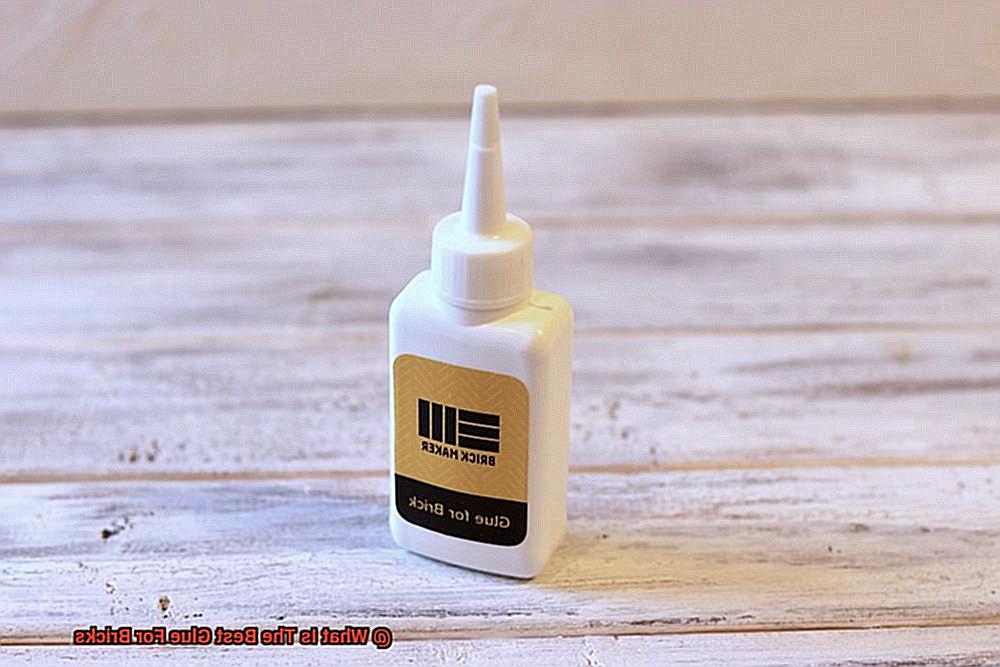
Bricks are the essential building blocks of strong and sturdy structures, and mortar is the secret sauce that holds them together. But why is mortar the go-to choice for bonding bricks?
In this article, we’ll explore the unparalleled advantages of using mortar as a glue for bricks. From its exceptional strength and flexibility to its water-resistance and cost-effectiveness, mortar proves itself as the ultimate adhesive. So, let’s dive in and discover why mortar reigns supreme.
Strength and Durability:
Mortar is not your ordinary glue; it’s engineered to provide exceptional strength. It allows your brickwork to stand the test of time, withstanding the weight and pressure exerted by the bricks. Imagine mortar as the superhero that keeps your bricks locked in place, ensuring a solid and long-lasting structure.
Flexibility:
One of the remarkable qualities of mortar is its flexibility. It’s like a yogi that can accommodate shifts and stresses caused by temperature changes or settling foundations without compromising the integrity of the brickwork. This flexibility prevents cracks and ensures that your structure remains stable over time.
Water-Resistance:
Mortar doesn’t just bond bricks; it creates a protective barrier against moisture. With excellent water-resistance properties, it’s suitable for both interior and exterior applications. Say goodbye to water seeping into your brickwork and causing damage. This water-resistance contributes to the longevity of your structure and reduces costly repairs.
Fire Resistance:
When it comes to fire safety, mortar is a reliable choice. It’s like a firefighter on duty, with excellent fire resistance properties. It doesn’t burn or release toxic fumes when exposed to high temperatures, making it a safe option for gluing bricks together. Rest easy knowing that mortar helps prevent the spread of fire within your structure.
Cost-Effectiveness:
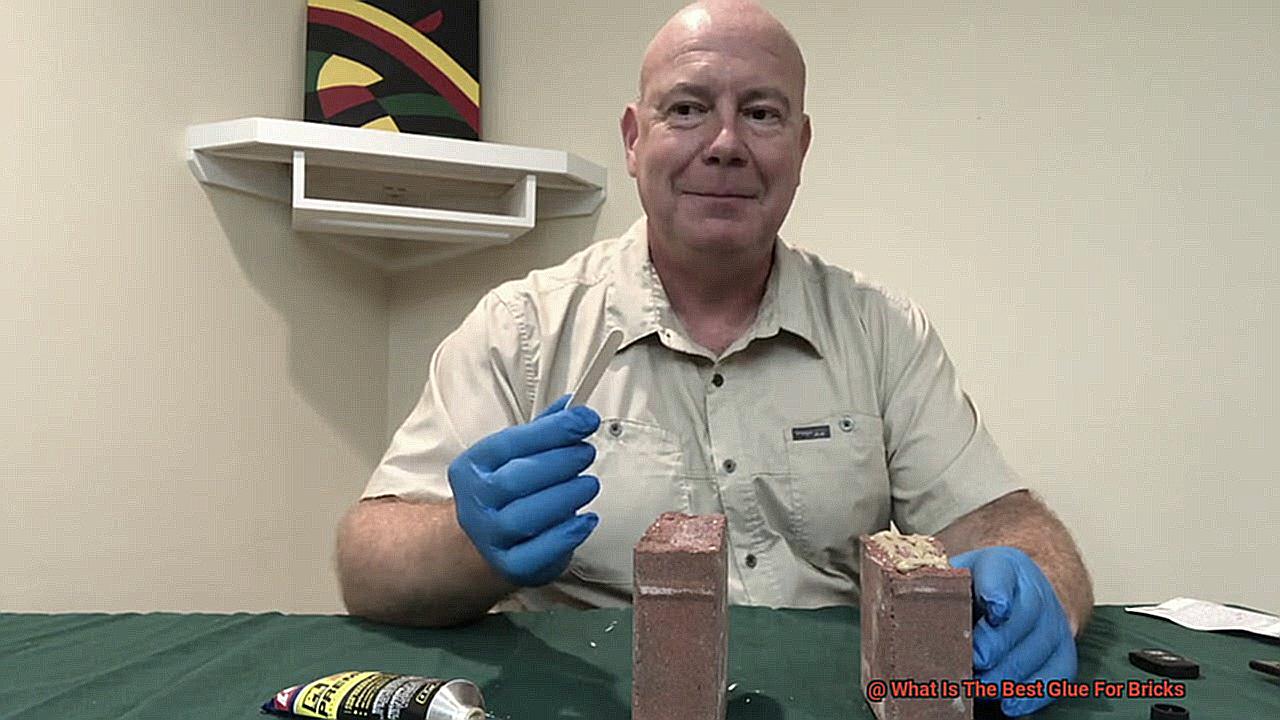
In terms of cost-effectiveness, mortar wins hands down. It’s readily available in the market at affordable prices, making it a practical choice for construction projects of any scale. Mortar’s availability and cost-effectiveness make it the go-to option for builders looking for an efficient and reliable adhesive.
Construction Adhesives: A Suitable Alternative to Mortar
Are you tired of the hassle and mess of mixing mortar every time you need to bond bricks? Well, we have good news for you. Construction adhesives are here to save the day as a suitable alternative to traditional mortar.
These specially formulated glues offer a range of advantages over mortar, making them a practical choice for bonding bricks and other building materials.
Let’s dive into the benefits of using construction adhesives and why they might be the superhero your construction projects need:
- Ease of Use: No more messy mixing or preparation. Construction adhesives come ready to use in convenient tubes or cartridges. Simply squeeze out the adhesive and apply it directly to the bricks. This saves time, especially for smaller projects or repairs.
- Speedy Bonding: Unlike mortar, which can take several days to fully cure, construction adhesives offer faster curing times. Within hours, you can achieve a strong bond between bricks, allowing for quicker project completion and reducing downtime.
- Durability: Construction adhesives have been developed to withstand various environmental conditions. They are resistant to water, weathering, and temperature fluctuations, ensuring the longevity of the bond between bricks. Some adhesives even have high-strength properties that rival or exceed traditional mortar.
- Flexibility: Construction adhesives can compensate for slight irregularities in brick surfaces. Unlike mortar, which requires precise bed and joint thickness, these adhesives can fill small gaps and inconsistencies, providing a more secure bond.
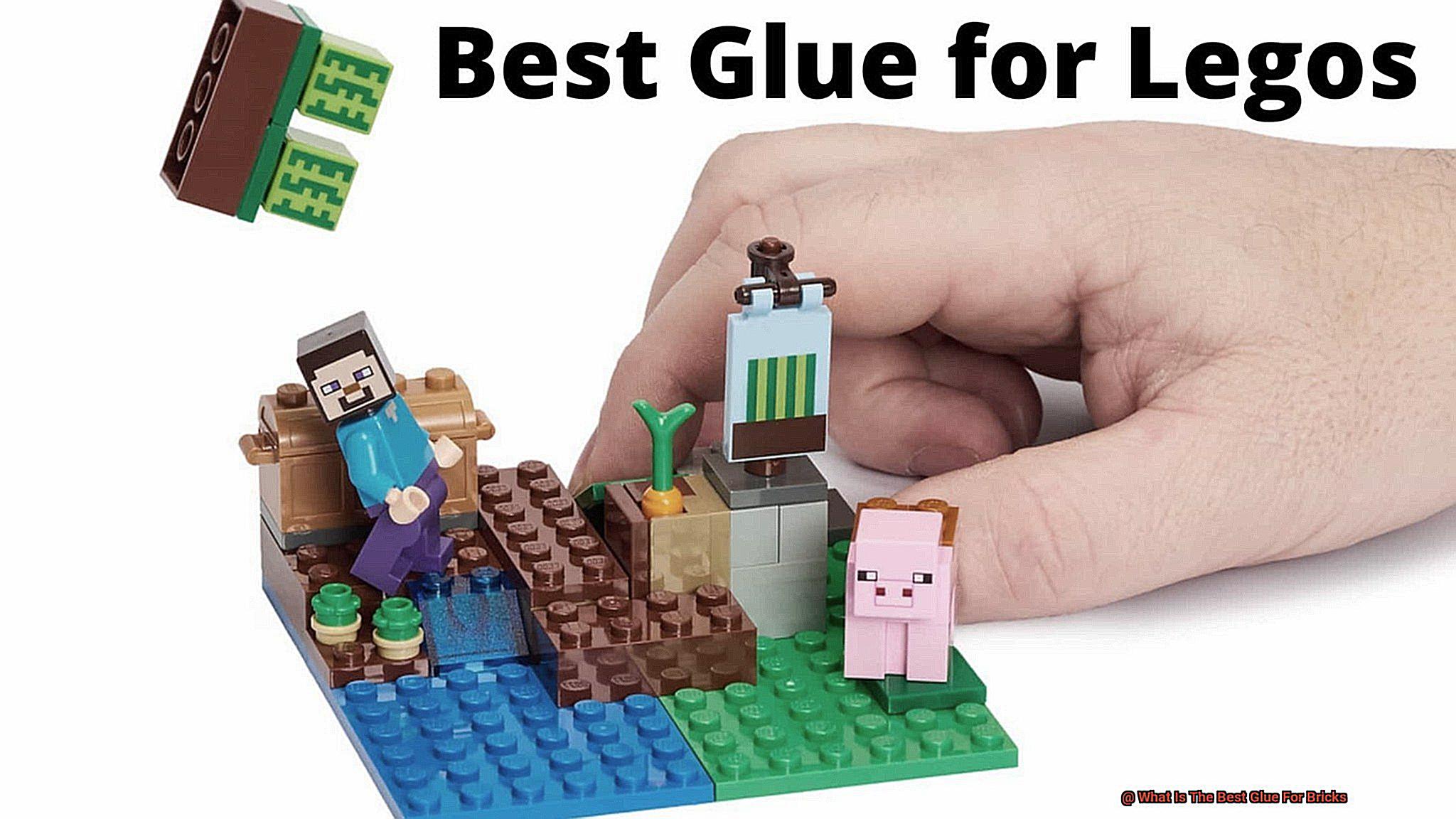
However, not all construction adhesives are created equal. When selecting an adhesive for bonding bricks, it is crucial to choose one specifically formulated for masonry applications. Look for adhesives labeled as “rated for vertical applications” or “high grab” to ensure better adhesion and reduce the risk of bricks slipping or sagging over time.
Remember, always follow the manufacturer’s instructions when using construction adhesives. Proper surface preparation, even application, and sufficient curing time are essential for a strong and long-lasting bond.
While construction adhesives offer numerous advantages, it is important to consider the specific requirements of your project. Load-bearing structures or projects with specific aesthetic needs may still require traditional mortar.
Benefits of Using Construction Adhesives for Bonding Bricks
Construction adhesives are here to save the day, offering a range of benefits that make them the ideal choice for bonding bricks.
First and foremost, construction adhesives provide a strong and durable bond between bricks. This ensures stability and longevity in your structures, preventing shifting or separation over time. With these powerful glues, you can have peace of mind knowing that your brickwork will stand the test of time.
One of the greatest advantages of using construction adhesives is the elimination of messy and time-consuming mortar. Instead, all you need is a simple caulking gun to dispense the adhesive and apply it precisely where you need it. No more mixing and spreading mortar, saving you valuable time and effort.
Not only are construction adhesives easy to use, but they are also incredibly versatile. Whether you’re repairing damaged bricks, attaching veneers or facing bricks, or securing bricks to other materials like concrete or metal, these adhesives have got you covered. They are a valuable tool for any construction or renovation project.
Time is money in the construction world, and construction adhesives offer a quick cure time. Once applied, the adhesive sets and bonds the bricks together rapidly, allowing for faster progress and reducing downtime. You’ll be amazed at how quickly your project comes together.
In addition to their speed, construction adhesives are also resistant to moisture and weathering. This means that your bonded bricks will withstand exposure to rain, humidity, and temperature fluctuations without deteriorating. Say goodbye to crumbling mortar joints.
But the benefits don’t stop there. Construction adhesives also provide enhanced insulation properties. The adhesive acts as a barrier, reducing heat transfer and improving energy efficiency in your building. By using construction adhesives for bonding bricks, you’re not only creating a strong structure but also a more energy-efficient one.
And let’s not forget about the weight. Construction adhesives are lighter than traditional mortar, making them easier to transport and handle. This not only saves you physical strain but also makes the construction process more efficient and cost-effective.
Other Types of Adhesives Used for Bonding Bricks
Selecting the right adhesive for bonding bricks is vital in constructing structures that are strong, durable, and able to withstand the test of time. While traditional mortar has long been the go-to option, there are several other types of adhesives available that offer unique advantages. In this in-depth guide, we will explore the different options for bonding bricks and delve into their key characteristics to help you make an informed decision.
Epoxy Adhesives – Unparalleled Strength and Durability:
Epoxy adhesives are renowned for their exceptional strength and durability, making them a top choice for bonding bricks. Consisting of a resin and a hardener, these adhesives need to be thoroughly mixed before application.
Once applied, epoxy forms a powerful bond that can withstand moisture, heat, and even harsh chemical exposure. This makes it an excellent option for industrial and construction applications where a high level of strength is required.
Polyurethane Adhesives – Flexibility and Weather Resistance:
If flexibility and resistance to movement and vibrations are important factors in your project, polyurethane adhesives are an ideal choice. These adhesives excel in withstanding environmental factors such as moisture, making them suitable for both indoor and outdoor applications. Available in liquid, gel, or foam forms, polyurethane adhesives offer versatility for various bonding needs.
Acrylic Adhesives – Swift Curing Time:
For projects that require a fast setting time, acrylic adhesives are the way to go. Known for their quick curing time and strong bond strength, they are often used in applications where efficiency is paramount. Available as liquids or tapes, acrylic adhesives provide ease of application while delivering reliable results.
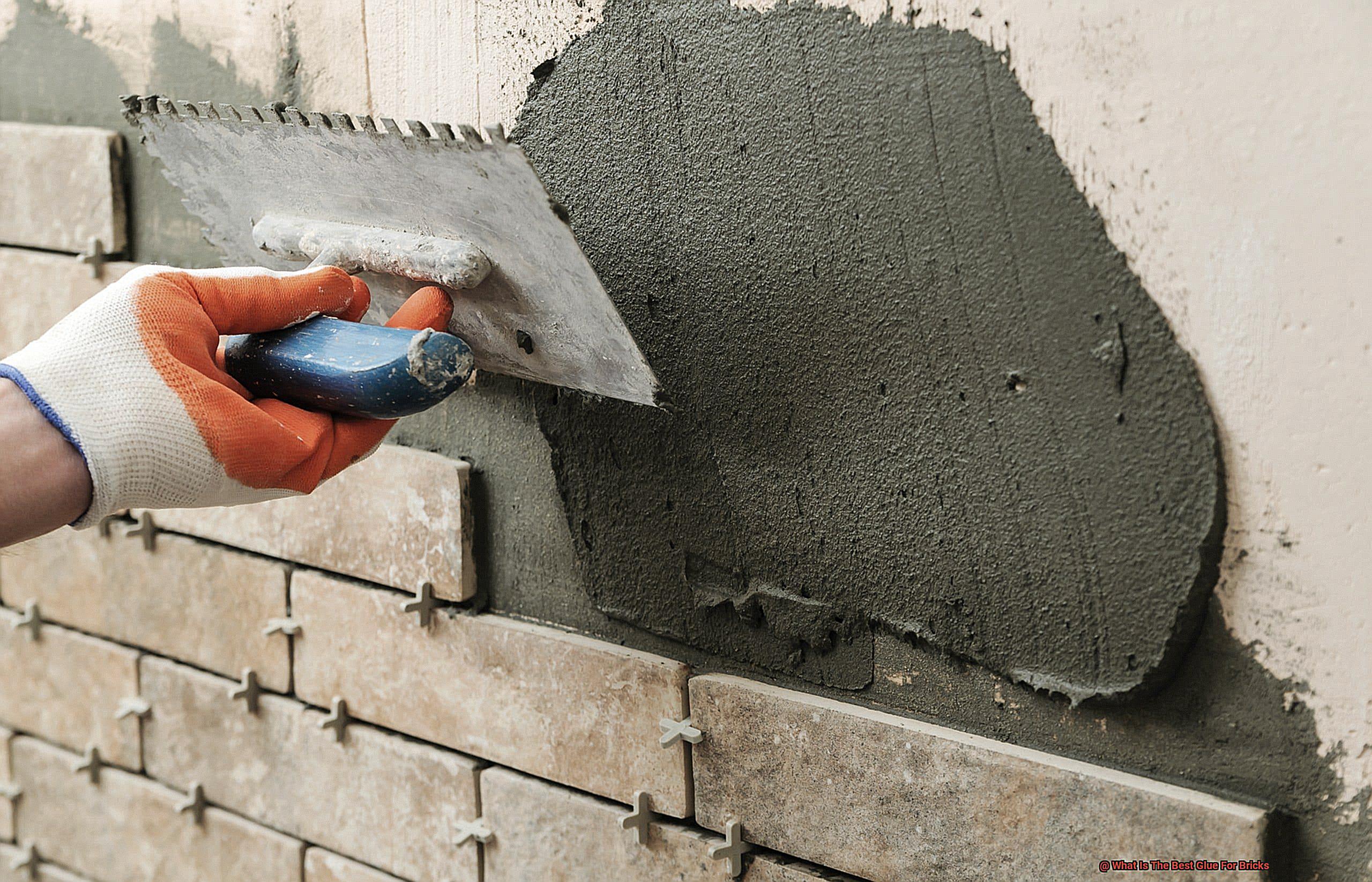
Silicone Adhesives – Flexibility and Temperature Resistance:
When it comes to flexibility and resistance to extreme temperatures, silicone adhesives shine. They form a strong bond that is also resistant to moisture and harmful UV rays. Whether in the form of sealants or adhesives, silicone options cater to different applications with ease.
Construction Adhesives – Versatile Bonding Solutions:
Construction adhesives are specifically designed for bonding a wide range of materials, including bricks. They offer high bond strength and durability, making them suitable for heavy loads. With different formulations available, such as polyurethane-based or hybrid polymer-based adhesives, construction options cater to various bonding needs.
Epoxy-Based Adhesives: Ideal for Industrial Applications
Epoxy-based adhesives are the unparalleled choice for industrial applications involving bricks. These adhesives offer a plethora of benefits that make them the go-to option for bonding bricks in heavy-duty settings.
First and foremost, epoxy-based adhesives are incredibly strong. The combination of a resin and a hardener creates a powerful chemical bond that can withstand heavy loads and stresses. This means that the bond between bricks will be long-lasting and reliable, ensuring structural integrity in industrial applications.
But strength isn’t the only advantage of epoxy-based adhesives. They are also highly resistant to various environmental conditions. With the ability to withstand temperature extremes, moisture, chemicals, and even UV radiation, these adhesives are perfectly suited for a wide range of industrial environments. Whether it’s a construction site exposed to harsh weather conditions or a manufacturing facility with chemicals present, epoxy-based adhesives can provide reliable bonding for bricks.
Another notable benefit is the long working time of epoxy-based adhesives. This extended working time allows users to properly position the bricks before the adhesive sets. In industrial applications where precise alignment is crucial for structural integrity, this feature is invaluable. It ensures that there is enough time to make adjustments and achieve accurate positioning, resulting in a strong and secure bond.
Furthermore, epoxy-based adhesives have the exceptional ability to fill gaps and bond irregular surfaces. Bricks may not always have perfectly smooth or even surfaces, but epoxy adhesives can compensate for these imperfections by filling in gaps and creating a strong bond. This feature is particularly useful in industrial applications where bricks may have slight variations in shape or size.
Lastly, epoxy-based adhesives cure to a rigid solid state, providing additional strength and stability to the bonded bricks. Once cured, the adhesive creates a durable barrier that protects the bricks from external forces and helps prevent cracking or shifting over time. This is especially important in industrial applications where the bonded bricks may be subjected to heavy loads, vibrations, or movement.
Polyurethane Adhesives: Flexible and Impact-Resistant
When it comes to bonding bricks together, you need an adhesive that can withstand the test of time and the challenges of the elements. Enter polyurethane adhesives – the superheroes of the adhesive world. With their exceptional flexibility, impact resistance, and ability to bond even in challenging conditions, they are the ultimate choice for ensuring a strong and durable bond between bricks. Let’s explore the remarkable properties of polyurethane adhesives that make them the perfect sidekick for your brick bonding needs.
Flexibility that Defies Expectations:
Bricks are not static; they can expand, contract, and shift due to temperature changes and structural movements. That’s where polyurethane adhesives shine. These adhesives possess remarkable flexibility, allowing them to accommodate these movements without compromising the bond. Unlike other glues that crack or break under pressure, polyurethane adhesives remain resilient and keep your bricks securely in place, ensuring a long-lasting bond that can adapt to the changing environment.
Impact Resistance like No Other:
Construction projects subject bricks to heavy loads or impacts, such as in walls or pavements. To ensure long-lasting stability, you need an adhesive that can withstand these forces without failing. Polyurethane adhesives boast high impact resistance, providing an unyielding grip on your bricks even under challenging conditions. They create a bond that stands strong against the test of time, ensuring your brick structures remain sturdy and resistant to damage.
Conquering Challenging Conditions:
Bricks that have absorbed water or are exposed to high humidity can pose a challenge for many adhesives. However, polyurethane adhesives conquer these challenging conditions with ease. These versatile glues can bond materials that are wet or have a high moisture content, making them perfect for outdoor applications or areas with high humidity. They excel where others falter, ensuring a reliable and moisture-resistant bond that lasts.
Proper Preparation for Optimal Results:
To maximize the performance of polyurethane adhesives, proper surface preparation is essential. Ensure that the surfaces to be bonded are clean, dry, and free from any dust or debris. In some cases, roughening the surface with sandpaper or applying a primer may be necessary to enhance the adhesive’s bond strength. Following the manufacturer’s instructions meticulously will ensure the best results and unleash the full potential of polyurethane adhesives.
Choosing the Right Glue Based on Brick Type
When it comes to choosing the right glue for your brick project, it’s essential to consider the specific type of brick you are working with. Different types of bricks have distinct properties and characteristics that require specific adhesives for a strong and long-lasting bond. Let’s delve deeper into some popular brick types and the recommended glues for each.
- Clay Bricks: Clay bricks are notorious for their high absorption rate, making them quite porous. To ensure a secure bond, it’s crucial to use a flexible and waterproof adhesive that can withstand moisture and allow for some movement. Look for adhesives labeled as flexible or water-resistant, as they provide the best results for clay bricks.
- Concrete Bricks: If you’re working with concrete bricks, which are denser and less porous than clay bricks, a strong adhesive is required to bond well with the smooth surface of concrete. Epoxy or polyurethane-based glues are often excellent choices, offering a durable bond and exceptional adhesion to concrete surfaces.
- Natural Stone Bricks: When working with natural stone bricks like granite or limestone, it is crucial to select a glue specifically designed for bonding stone materials. These specialized glues are formulated to provide a strong bond and withstand the natural movement and expansion of stone.
It’s important to also consider the intended use of your brick structure when selecting an adhesive. If the structure will face extreme weather conditions or heavy loads, a stronger adhesive may be necessary.
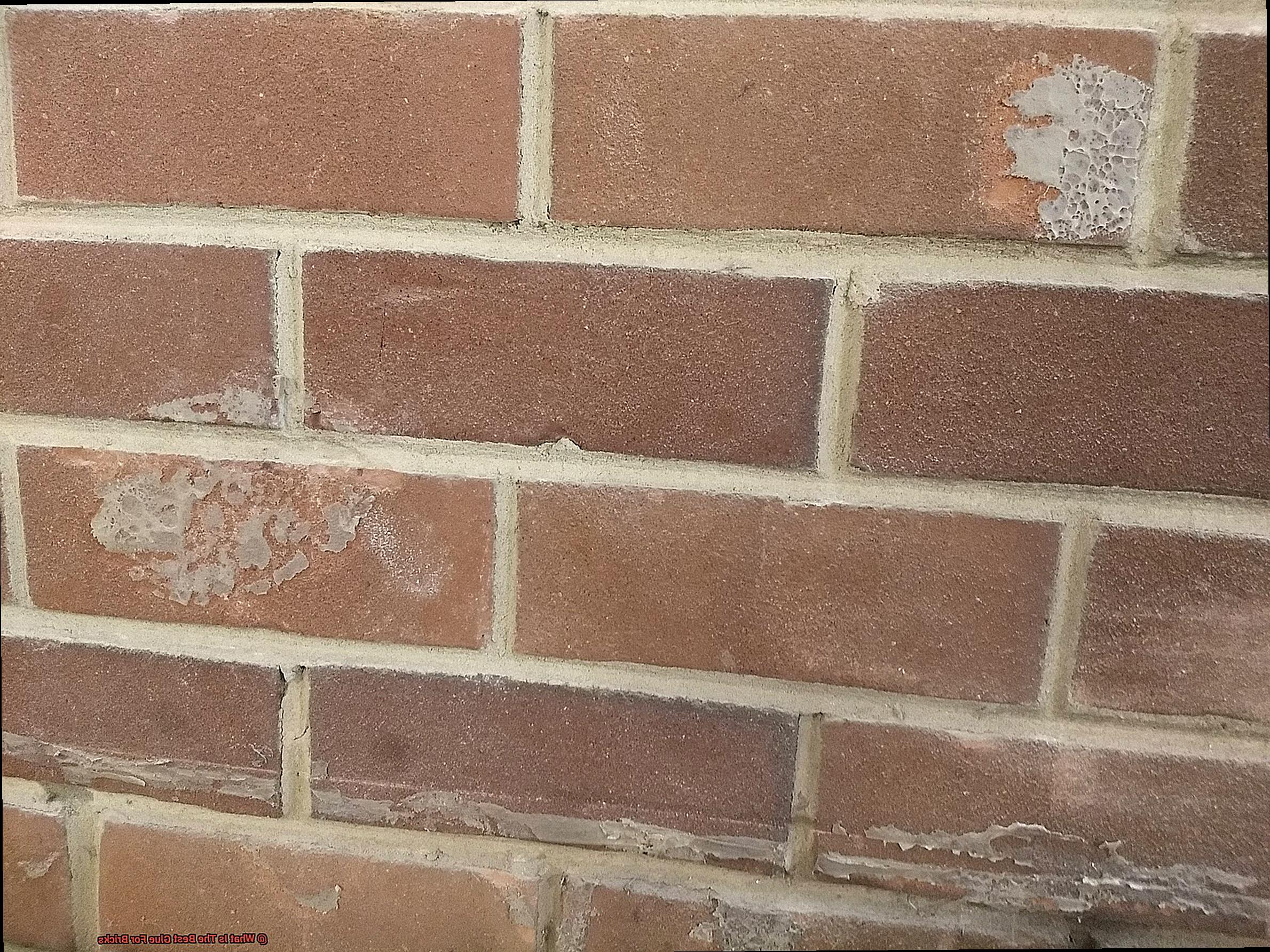
Before applying any glue, thoroughly clean the surface of your bricks to remove any dirt or debris that could hinder adhesion. Additionally, it’s wise to test the glue on a small, inconspicuous area first to ensure compatibility and achieve desired results.
When in doubt, consulting with a professional or referring to the manufacturer’s instructions is always recommended for guidance on selecting the appropriate glue for your specific brick type.
mA-xRl0Bzmo” >
Also Read: How to Glue Wood to Brick?
Conclusion
When it comes to finding the best glue for bricks, there are a few top contenders that stand out from the rest. These glues not only provide a strong bond but also offer durability and versatility for various brick projects.
One of the leading options is epoxy adhesive. This powerful glue is known for its exceptional strength and ability to bond different materials together. With its high resistance to heat, water, and chemicals, it ensures that your bricks stay securely in place even under adverse conditions.
Another excellent choice is polyurethane construction adhesive. This adhesive forms a robust bond that can withstand heavy loads and extreme weather conditions. Its flexibility allows for expansion and contraction of the bricks without compromising the bond, making it ideal for outdoor applications.
For quick and easy fixes or smaller projects, instant adhesives like cyanoacrylate glue can be a game-changer. These super glues have rapid curing times and provide an instant bond between bricks. However, they may not be as suitable for larger or load-bearing structures.
Lastly, mortar mix can also be considered as a reliable option for bonding bricks together. It offers excellent adhesion properties specifically designed for masonry applications. While it requires more time to cure compared to other glues, mortar mix provides a traditional and authentic look when used between bricks.
In conclusion, the best glue for bricks depends on your specific needs and project requirements. Whether you’re looking for strength, flexibility, quick fixes, or traditional aesthetics, there is a suitable adhesive out there.

